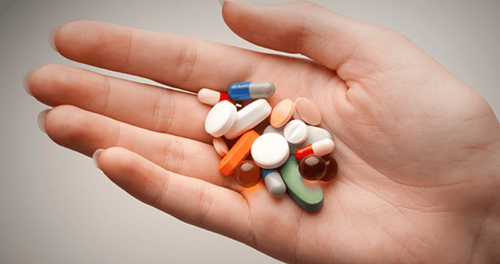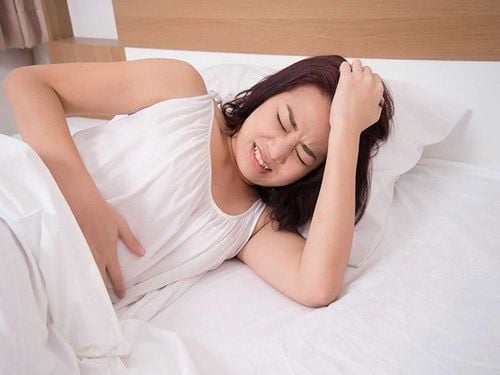This is an automatically translated article.
The article was professionally consulted by MSc.BSCK II Nguyen Thi Huong Linh - Obstetrician and Gynecologist, Vinmec Times City International Hospital.Each person's menstrual cycle usually has a certain cycle, number and characteristics. Menstrual disturbances can be in girls at puberty or at the age of pre-menopausal disorders due to endocrine disorders, but there are menstrual disorders that are abnormal signs that warn of dangerous diseases. So are you experiencing symptoms of irregular periods - and if so, does it require treatment? Let's learn to have more useful information to share with friends and family.
1. What is menstrual disorder?
Menstruation is a periodic shedding of the uterine lining due to hormonal changes that cause bleeding from the uterine cavity to the vagina. Menstruation for the first time appears in girls from 12-16 years old, the average cycle is 28 days, but there are some cases shorter than about 25 days or longer than 30-35 days, depending on the person and time. Usually lasts 3-5 days. The amount of blood lost after each menstrual period is from 50-150 ml.Menstrual disorders: are abnormal manifestations of the menstrual cycle, the number of days of menstruation and the amount of menstrual blood compared to the previous normal cycles. These may be symptoms of a certain disease, may be due to endocrine, may damage the female genital organs, sometimes simply due to changes in living conditions and environment.
Menstrual disorders can occur in women of many ages, levels and manifestations such as in puberty, childbirth, menopause, ... directly affecting health and ability. physiological and reproductive function of women if not treated promptly.

2. Manifestations of menstrual disorders
Irregular menstrual cycles are not always a sign of a health problem. However, you should still pay attention when experiencing some of the following abnormal symptoms of menstrual disorders.Irregular menstrual cycle: Is when your menstrual cycle is longer than 35 days (menorrhoea) or less than 22 days (fast), even if you have not had a period for 6 months or more (amenorrhea).
Abnormalities in menstrual bleeding: Abnormalities in the number and days of menstruation.
Hypermenorrhoea: also known as menorrhagia, menstrual blood volume > 20ml/period. Omenorrhea: number of menstrual days < 2 days and menstrual volume < 20ml/period. Menorrhagia: the number of days of menstruation > 7 days. Menstrual color: Usually dark red blood, has a slightly fishy smell, does not clot, if menstrual blood is mixed with clots or bright red or light pink blood is abnormal.
Abnormalities in other symptoms when coming to the menstrual cycle: In which, menstrual abnormalities, dysmenorrhea are the most common phenomenon, often with symptoms of lower abdominal pain during menstruation. If it hurts, the pain can radiate through the spine, down the thighs, and into the abdomen. In addition, you can see back pain accompanied by chest tightness, breast tenderness, nausea, easy emotions, affecting daily life and work.
3. Causes of menstrual disorders
Menstrual irregularities occur in many people, but not everyone knows the cause, or it is not always due to a single cause. Here are some common causes of menstrual irregularitiesHormonal influences
Every woman's phase affects her hormonal balance including puberty, menopause, pregnancy , childbirth, and breastfeeding will affect menstruation. During puberty, the body undergoes major changes. It can take several years for estrogen and progesterone to reach balance, and irregular periods are common at this time. During perimenopause, the ovaries decline, female hormones change, making the menstrual cycle and blood volume change. Menopause is 12 months from a woman's last menstrual period. After menopause, women will no longer have periods. During pregnancy, menstruation stops. Most women do not have periods while breastfeeding. Physical causes:
Abnormal pregnancy: Ectopic pregnancy, threatened miscarriage. Physical lesions of the cervix - cervical polyps - Ovarian polyps - uterine fibroids, endometrial hyperplasia, endometrial cancer, cervical cancer, polycystic ovary .. Pituitary tumor, thyroid disease, diabetes. Bacterial infections: genital tract infections, endometritis. Changes in living conditions and living habits:
Menstruation is regulated by endocrine - nervous mechanisms, so when you change your living environment, such as moving, changing jobs, being under pressure to study, family or work making a woman depressed or sad also disrupts menstruation.
Diet: Changes in diet, excessive weight gain or weight loss also disrupt menstruation.
Excessive exercise: Also increases the amount of menstruation and prolongs the menstrual period.
Some drugs cause menstrual disorders, especially birth control pills, diabetes drugs, high blood pressure.

4. Is menstrual disorder dangerous? The answer is yes!
Anemia: Heavy and prolonged menstrual bleeding will lead to anemia, dizziness, fatigue, pale skin, heart arrhythmia, shortness of breath, etc. In severe cases, it can affect health and even calculation. your network. The risk of gynecological diseases: The prolonged menstrual cycle not only causes inconvenience to daily activities, but also creates a favorable environment for bacteria to easily grow, causing inflammatory diseases of the "private area" (vaginitis). , endometrial tumor, ovary inflammation, ...). Risk of infertility: You may have a harder time getting pregnant if you have irregular periods because of irregular ovulation, or because of an infection that blocks your fallopian tubes. Affects sexual activity: Scientific studies show that having sex on "red light" days can increase the risk of gynecological diseases. Therefore, menstrual disorders partly make your love affairs become more erratic. Effects on female beauty: Estrogen and Progesteron are two hormones that play the role of the source of female beauty. Therefore, the disturbance of these hormones will directly affect the beauty and youth of women, make blood circulation poor, make the skin less smooth, make women irritable, short-tempered, ... Not only that, menstrual disorders also cause anxiety, stress, and loss of confidence in many women, significantly reducing quality of life. Dangerous diseases: Some cases of menstrual disorders are manifestations of diseases such as ectopic pregnancy, endometrial cancer, ... it will be very dangerous if you go to the doctor late.
5. How to treat menstrual disorders?
Menstrual disorders are a common problem in women. However, you should see your doctor if you have menstrual irregularities to get a definite diagnosis, to rule out a physical illness that requires hospital treatment. As for the functional menstrual disorders, the doctor will advise you to treat and monitor at home. Here are some simple suggestions to improve the symptoms of this functional menstrual disorder:Improve your diet, sleep, and work properly. Women must adjust their diet to suit the time and add nutrients to the body. Actively exercising regularly, even a few small movements every morning for 15-30 minutes can also help reverse menstrual disorders.
Keep your mind at ease. Try to work and live in a clean, fresh and stress-free environment as much as possible. You can practice thinking about happy, positive things, you can listen to music or talk to friends more to relax your mind.
Using oral contraceptives It is advised that you do not abuse the pill too much. Birth control pills are drugs that can cause many side effects, you should consult your doctor if you want to use birth control pills and there are many other methods of birth control for you to choose from.
Limit the use of stimulants such as alcohol, beer, tobacco and other stimulants The heavy use of alcohol and tobacco not only affects the endocrine system, causing menstrual disorders but also affects the skin. yours too. So, limit it to the lowest possible level to have a regular menstrual cycle!
Treatment of other diseases, if any: Thyroid, diabetes, ... In addition, if the symptoms are still not improved, go to the doctor immediately for advice and treatment to restore health!
Please dial HOTLINE for more information or register for an appointment HERE. Download MyVinmec app to make appointments faster and to manage your bookings easily.














